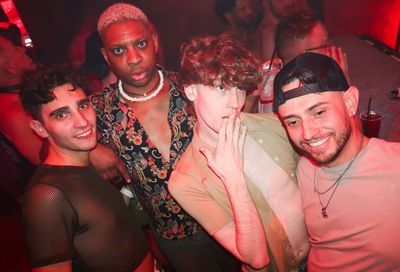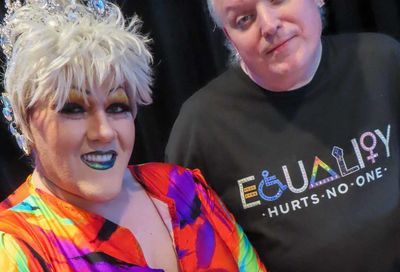Hard Feelings
In 'Hard,' former Washingtonian Wayne Hoffman shows a world devoid of absolutes, with plenty of unresolved questions
Generally, when a novel throws characters at readers in quantities not easily digested, it’s time to settle in for either an epic war story or a multi-generational tale of some family’s rise and fall, its demons and its redemptions.
Hard, a new novel by former Washingtonian and now New Yorker, Wayne Hoffman, is a bit of both. If policing terrorists can be called a ”war,” then this diluted-for-the-21st Century phrase may be easily applied to the conflict Hoffman presents: the war for sexual expression fought by gay men in mid-’90s New York, against those who would close sex venues to stop the spread of HIV. Sex-positives versus the new monogamists. Hoffman’s also got the family angle, telling the story of a community and the adopted families so common to gay people.
|
So who are the characters? Moe Pearlman is our anti-hero, happily blowing his way through the phalluses of the Big Apple as both pleasure and political statement. It’s up to this young man — with his widening girth, media access, and mix of cynicism and optimism — to save gay men’s collective libido. His nemesis is Frank DeSoto, a somewhat reclusive curmudgeon who single-handedly publishes a rag of a gay newspaper, dedicated to screeds against sexual liberation. Considering Frank lost everyone dear to him in the first wave of AIDS deaths, Hoffman has not painted him as an entirely unsympathetic character.
Filling in the rest of the space, there is irrelevant Gabe; best friend Aaron; hotty photographer, Kevin; Gene, Moe’s lovable, HIV-positive ex; the Guttmachers, Abe and Carolyn, a father-daughter publishing duo; and Max Milano, whose name must certainly have popped up in an episode of Charlie’s Angels or the Love Boat as an Italian fashion designer. Here, he’s the smoldering man of mystery. There are others, but these nine are plenty.
Though Gabe may be dismissed, not much else can. Through the first half of the book, Hoffman piles on the layers that seem to bury readers. Are we comically following Moe’s quarter-life crisis? Or Aaron and Kevin’s budding romance? Or a media war? Patient readers will, however, be rewarded. It’s hard to point to a specific point wherein the story gels, but it does. Once that happens, we realize that Hoffman has not included all these bits and pieces the sake of exercising his typing fingers. He’s not creating a black-and-white morality play, but rather he’s deliberately employing all his layers to show the world in a more accurate light: devoid of absolutes, with unresolved questions, loving, venomous, frustrating and satisfying.
The trappings of Hoffman’s Hard really become secondary to his style of blurred lines and intangibles. The setting is likely just what comes easiest for him. While Moe gets the chance to create a respectable newspaper for gay New Yorkers, Hoffman once served as an editor for the New York Blade News. The sex debate is old hat for Hoffman, an editor of 1996’s Policing Public Sex. And Hoffman’s exodus from D.C. to NYC gets played out as well. So Hoffman is writing what he knows — there’s nothing wrong with that. It will be exciting, however, if he chooses as a novelist, as some point, to venture out of areas familiar enough to readers as to be somewhat pedestrian. In his writing, Hoffman clings more to the ”Five Ws” and loads of dialogue than other novelists might, thanks likely to his reporting skills. But the most powerful passage, without question, centers fully on the Frank character’s internal, emotional state.
”Frank looked down at the boy ready to take him inside, willing to accept him, happy to arouse him. And it was Scott…. He felt a warm tenderness, a deep affection, perhaps a twinge of love. He also felt a deep, intense desire, a stirring inside him that he hadn’t felt for ages. Yes, it was Scott, back in the bed, alive, healthy, and ready to make love.”
The entirety of the passage raises goose-bumps, and even a tear from the particularly sentimental.
This passage — along with the title, cover art and synopsis — suggests that there’s some fairly graphic sex in Hard. There is. Quite a bit of it. In that vein, Hard could even be considered a good beach read. Hoffman gives his readers as much graphic sexual description as most could want. In the end, however, Hard is not a story about sex. At its best, it’s a story about emotion and sentiment. Like sex, however, the story can be a little hard to define, sometimes messy — and generally satisfying, particularly at the end.
Support Metro Weekly’s Journalism
These are challenging times for news organizations. And yet it’s crucial we stay active and provide vital resources and information to both our local readers and the world. So won’t you please take a moment and consider supporting Metro Weekly with a membership? For as little as $5 a month, you can help ensure Metro Weekly magazine and MetroWeekly.com remain free, viable resources as we provide the best, most diverse, culturally-resonant LGBTQ coverage in both the D.C. region and around the world. Memberships come with exclusive perks and discounts, your own personal digital delivery of each week’s magazine (and an archive), access to our Member's Lounge when it launches this fall, and exclusive members-only items like Metro Weekly Membership Mugs and Tote Bags! Check out all our membership levels here and please join us today!





















